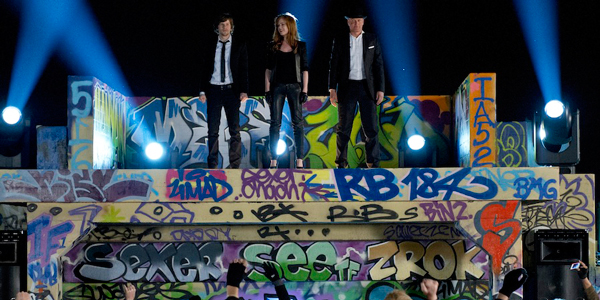Culture
Nothing to “See” but sleight-of-hand

Now You See Me
dir. Louis Letterier
Release Date: May 31, 13
- 1
- 2
- 3
- 4
- 5
- 6
- 7
- 8
- 9
- 10
Now You See Me starts off by requesting its audience to look closely, a foolish maneuver for a film unprepared to defend itself against such scrutiny. Most movies about either heists or magicians, both of which the film offers aplenty, hit an inevitable point where they have to commit to either a) paring back the action so as to make the internal logic as airtight as possible or b) admit upfront that some of this can’t be explained, and encourage the audience to go along with it. Now You See Me chooses neither, asking its viewers to suspend their disbelief so thoroughly that by its end, it doesn’t even bother to solve one of its biggest mysteries.
Like The Avengers as filtered through the late-career dreams of Criss Angel, the film begins with four unassociated magicians of varied reputations being summoned by cryptic tarot cards. There’s the fast-talking, cocky performer (Jesse Eisenberg, Hollywood’s go-to option when dialogue needs to be delivered as vaudevillian as possible), the sexy escape artist (Isla Fisher), the grizzled mentalist (Woody Harrelson) and the wisecracking pickpocket (Dave Franco). A year after being summoned, they’ve become the hottest act in Las Vegas, drawing the attentions of an insurance tycoon (Michael Caine) and a hunter of magicians who’s lived well off his series of videos debunking big-ticket acts (Morgan Freeman). After one of their stunts involves the impossible robbery of a French bank, Mark Ruffalo’s perpetually confused cop is put on the case, paired with an irresistible young Interpol agent (Melanie Laurent), whose beliefs in the power of mysticism offset Ruffalo’s nebbish anger. If you think that the film won’t force sparks to fly between them, look closely.
Names are hardly necessary, as nobody in the film is asked to play into anything beyond their general types, both as actors and as characters. Just by looking at the cast, one can easily suss out how each will be asked to engage with the three increasingly elaborate tricks (or illusions, Michael!) that the film substitutes for actual plot or dramatic intrigue. One of the problems with “puzzle box” films like this one is that you, as the viewer, are aware that no matter how much you think you’ve figured out the movie, there’s a lot more runtime to go and therefore a wealth of red herrings and twists awaiting. Because of this, the inclination is to spend way more time piecing together the mysteries than paying any particular attention to the movie.
Again, one can hardly be blamed; with the exceptions of Eisenberg’s Mark Zuckerberg reprise and Ruffalo spouting off one-liners, none of the performances or big moments really land. And by the time the film reaches its convoluted finale (which, among other things, suggests that the film’s police forces are so inept that they wouldn’t walk deep enough into a room to see their reflections in the walls), you won’t even care that it doesn’t explain what “The Eye” at the center of the mystery actually is, or that you sat through just under two hours of nonsense. That’s the biggest trick Now You See Me has up its sleeve: pretending with such conviction that it’s about lots of things that the vacuousness at its center becomes invisible. But if you look as closely as the movie wants, you’ll see that nothing’s there.